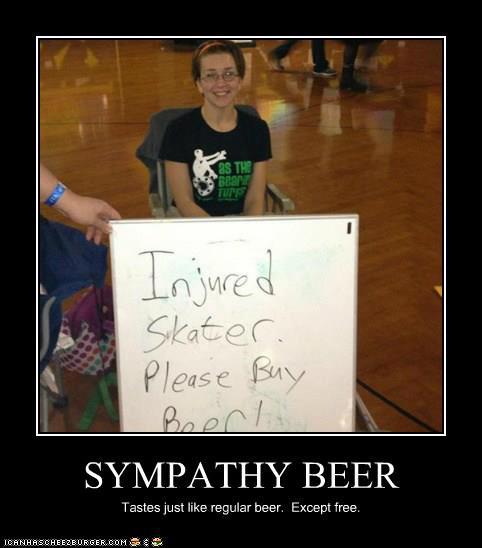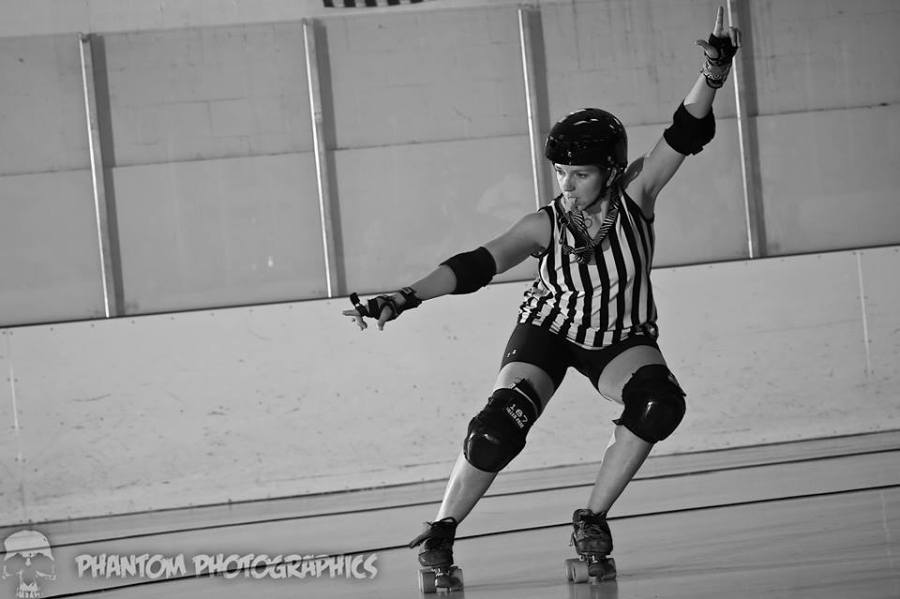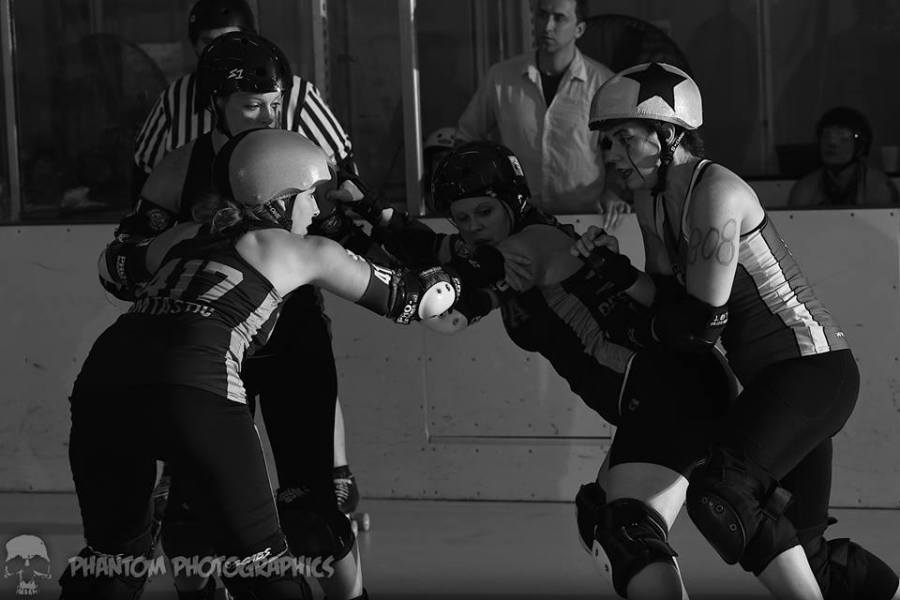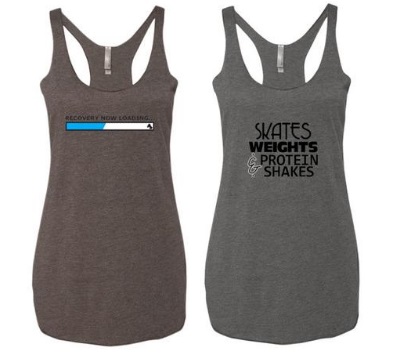Taking care of ourselves needs to be priority number one in Roller Derby. We believe we cannot be a good teammate if we are falling apart at the seams: physically, emotionally, or mentally. We must achieve perfection. We must not falter.
But injury happens, and there is hesitation to talk about it openly. There is a reluctance to admit it.
More openness has been happening in the social media world about what we struggle with in our daily lives; we are becoming brave enough to own our illnesses in a public forum, and discuss our injuries with our friends miles away. You’ll find more blogs, IGs, and threads happening now around how to deal with depression in the face of practice, or anxiety because of expectations placed on them, or how badly someone’s knee swelled up after a particularly hard hit. I have seen postings about imposter syndrome, dysmorphia, misophonia (me), and bipolarism most commonly.
There are several groups online dedicated to those who have gone through injury, and how they are recovering and processing the ordeal. In these groups, we can be honest about how we reinjured ourselves, or are going to the ortho for a DIFFERENT limb, or can empathize about when a recovery is not going as we had hoped in our minds. They allow us to vent our frustration and document our journey of reintegration into our sport.

But when we walk through the door of practice, the conversation and understanding stops. Sometimes, when we are feeling things online and want to talk about them we pause.
We don’t want that THR to see that we had a panic attack. We don’t want our captain to hear that our ankle swelled up after practice. It’s not perfect, it’s not pretty. It’s not the model athletic stone statue that we have been told to be.
When we come to practice, there is a feeling that we are under a microscope. We cannot look sad. We cannot be in pain. We cannot have an off day. We cannot let the wet wool blanket weigh us down. We cannot injure anything else. We fear showing weakness …
“Unless you are the right person.”
I hate that I have had discussions with people across the world, in every level of play, who have said that members of their league are held to different standards. If they look mean, it’s ok. If they pull a muscle in their back in the gym, it’s no problem. If they de-gear early because of personal issues, no sweat. Meanwhile, other skaters fear they will be removed from charters, blacklisted from teams, or generally forgotten among the crowd if they show ‘signs of weakness’ within our world.

[And I’m going to venture to say this stems from the “Perfect Life” that we are expected to upkeep on our SnapChats, Facebooks, and Instagrams.]
You’re not allowed to be disappointed in yourself. You’re not allowed to show that disappointment. You’re certainly not allowed to leave the track so that others aren’t affected by your disappointment. All this, unless you are one of the few granted human status because they are that good or popular.
I have seen people in leadership roles belittle others who decide not to push through injury. For years, I have thought twice about sharing my journeys and experiences because “Why would someone put you on a team if you have bad knees?” or “Maybe you wouldn’t get benched if you weren’t always talking about your injuries on Facebook” or “Well, we can’t give you feedback. You look like you’re always about to cry.”
So what happens? People hide the injuries. They don’t admit the have a high ankle sprain because there is a game coming up. They avoid bracing “to get better at a different position” but really it’s because their shoulder is searing with pain. They play off how hard they hit their head when they fell at home, because they don’t want to be concussion tested.
And how do you think this all plays out later when the weakness is tested. I know I tore my ACL because I refused to admit I was playing on a high ankle sprain. Friends have torn rotator cuffs, cracked the bones in their feet, or get Second-Impact Syndrome from falling.

I am tired, folks. I am writing this and I’m just mentally exhausted with trying to understand all of the rights and wrongs going on in our world right now beyond derby. There is so much hate and anger in humans, and tackling this issue seems so daunting. Usually in my blogs, I would go forth with “here are some ways we can deal with it”, but honestly …. I do not know how. This is a culture thing inside of roller derby.
How do you we make it ok for us to be human? Especially in a world where some people cannot even exist without fighting for their space. We say we’re inclusive and we say we’re forward thinking but our community is a product of the society we live in. There is so much to overcome, and to add to the classism, sexism, racism, transphobia, etc that we contend with, now there is the fear of honesty.
I bonded with a teammate when we admitted to each other last year that we downplay our pain. We don’t want “to be that player that is always hurt, or made of glass.”
As a coach, I keep telling my team members that if they’re sick, injured, or mentally unwell it is OK. It does not make them a disappointment. They are not letting anyone down, and that derby will still be here when they are healthy. As a player I fight against it daily.
Captains and coaches have to understand that we are not deities formed from clay. Our teammates have to have empathy and understand that we all suffer through different issues. Prehab programs to keep skaters physically healthy could help, and rehab options in house are great for skaters coming back or with small injuries. Sometimes, just letting folks who feel alone know that they are not can be a catalyst for mental recovery.
I just had a huge panic attack simply through the effort of trying to make a point. I deleted everything that I said. Tried to erase it, and felt like erasing myself. All I can think was, “I should stop officiating. If I cannot even make it understood that I was not on the offensive, and that I am saying the same thing as everyone else… why should I be allowed to officiate? If no one is listening to me here, why should they anywhere?” And for those of you with anxiety disorders, you can imagine the downward spiral from there.
[No, I am not lost on the irony of a writer having a panic attack as a result of stating an observation of the life surrounding.]
Stigmas are everywhere and they pervade our culture. We need to stop judging each other and start listening. We need to start understanding. We need to stop being afraid of admitting pain. We need to stop being afraid to admit trepidation. We should be allowed to be disappointed. We should be allowed to be injured, to be broken, and to need a moment to recover without guilt.
We are a family. We need to start treating each other more as such, and less as simply stepping stones to get to the next goal on the list. So hey, Roller Derby? Let’s love each other a little more and break away from expectations of perfection, shall we?




























